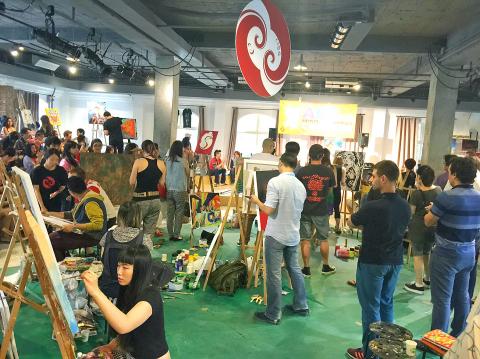Life is tough enough being a marginalized refugee in a new country — but when you are a lesbian, gay, bisexual or transgender refugee from a culture that does not approve of your orientation, you face a whole new level of fear and isolation.
Even before the Islamic State showed up and started killing suspected homosexuals, it had long been illegal to be gay in Syria — punishable by three years in jail.
“This is a situation that very few people are talking about,” Roma Mehta of the Red Room says. “But every time you mention it to somebody they are like, ‘It makes complete sense. Of course they would be even more marginalized.’”

photo courtesy of red room
The Red Room, which aims to provide a platform to bring together Taiwan’s creative community, has selected the Germany-based Queer Refugees Network Leipzig (QueeRNL) project as the beneficiary for the fourth installment of its all-day live art event, Artists Bridge The Gap, set for May 29.
As in the past, the event will feature artists creating work on the spot, along with live music and theater, food and activities to further connect attendees with the refugees they are helping.
The art will be auctioned at the end of the day, with all proceeds (and a portion of the entrance fee) going to QueeRNL to help relocate these refugees to safe shelters and provide integration programs as well as networking opportunities, financial aid and counseling.
Leah List, volunteer coordinator with Red Room, says she wanted to focus on a smaller non-governmental organization that focuses on a specific, oft-overlooked issue.
“Sometimes if you speak in vague terms, a lot of people disconnect a little,” she says.
There will be a video screening room where people can learn more about the lives of LGBT refugees and send them postcards, and List has worked with an artist to create a comic book about the topic that extends into the live theater piece. Red Room has also gathered a group of musicians to write and record a song, We Stand Tall, for the event.
“We are hoping to have the whole room sing the song, and we will record it and send it to them,” Mehta says.
List says the event is more than just a good cause — it is about building community, international exchange and creating opportunities — whether it be for the refugees, the artists or the attendees.
“And that’s how we are bridging gaps,” she says.

Dissident artist Ai Weiwei’s (艾未未) famous return to the People’s Republic of China (PRC) has been overshadowed by the astonishing news of the latest arrests of senior military figures for “corruption,” but it is an interesting piece of news in its own right, though more for what Ai does not understand than for what he does. Ai simply lacks the reflective understanding that the loneliness and isolation he imagines are “European” are simply the joys of life as an expat. That goes both ways: “I love Taiwan!” say many still wet-behind-the-ears expats here, not realizing what they love is being an

Google unveiled an artificial intelligence tool Wednesday that its scientists said would help unravel the mysteries of the human genome — and could one day lead to new treatments for diseases. The deep learning model AlphaGenome was hailed by outside researchers as a “breakthrough” that would let scientists study and even simulate the roots of difficult-to-treat genetic diseases. While the first complete map of the human genome in 2003 “gave us the book of life, reading it remained a challenge,” Pushmeet Kohli, vice president of research at Google DeepMind, told journalists. “We have the text,” he said, which is a sequence of

Every now and then, even hardcore hikers like to sleep in, leave the heavy gear at home and just enjoy a relaxed half-day stroll in the mountains: no cold, no steep uphills, no pressure to walk a certain distance in a day. In the winter, the mild climate and lower elevations of the forests in Taiwan’s far south offer a number of easy escapes like this. A prime example is the river above Mudan Reservoir (牡丹水庫): with shallow water, gentle current, abundant wildlife and a complete lack of tourists, this walk is accessible to nearly everyone but still feels quite remote.

It’s a bold filmmaking choice to have a countdown clock on the screen for most of your movie. In the best-case scenario for a movie like Mercy, in which a Los Angeles detective has to prove his innocence to an artificial intelligence judge within said time limit, it heightens the tension. Who hasn’t gotten sweaty palms in, say, a Mission: Impossible movie when the bomb is ticking down and Tom Cruise still hasn’t cleared the building? Why not just extend it for the duration? Perhaps in a better movie it might have worked. Sadly in Mercy, it’s an ever-present reminder of just